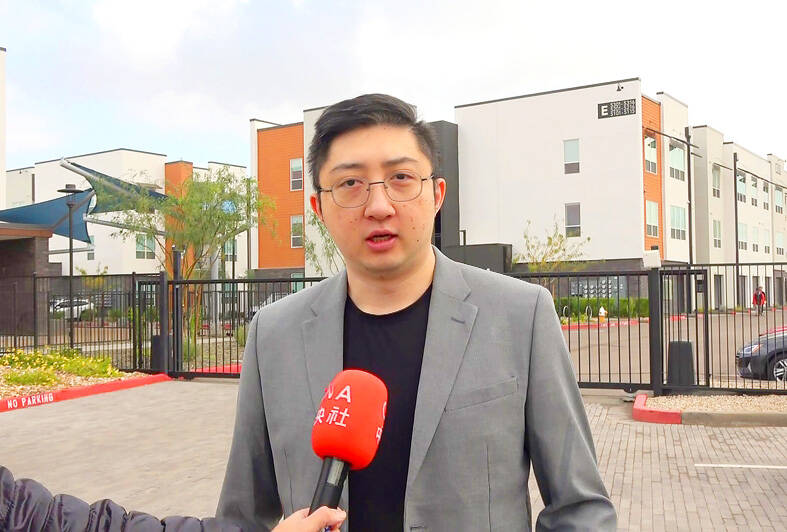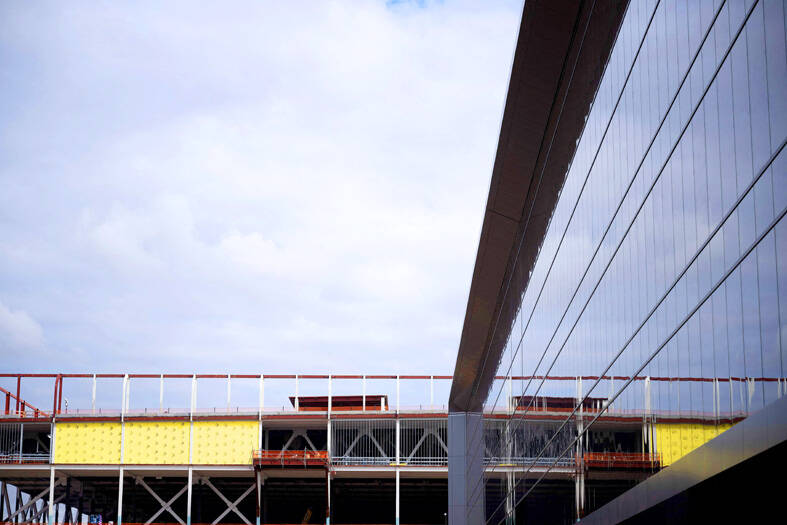The building of a Taiwan Semiconductor Manufacturing Co (TSMC) plant in Phoenix, Arizona, is expected to lead to the creation of a “Little Taipei” over the coming year, as TSMC employees and related companies move in, a Phoenix-based real-estate agent has said.
TSMC is investing US$12 billion to build a wafer plant in northern Phoenix that is scheduled to begin mass production in 2024. The company on Tuesday held a “tool-in” ceremony to mark the installation of the first batch of equipment at the fab.
Some TSMC employees have moved into newly constructed apartments in a community 10 minutes’ drive from the plant, while several other residential units are under construction, the Central New Agency (CNA) learned on Monday.

Photo: CNA
A TSMC engineer, surnamed Lin (林), recently arrived in Arizona with his wife and their two-year-old daughter.
Lin said they have been staying in a hotel since their arrival a couple of days earlier and would move to their new home in a few days.
Working as a dispatcher in the US is a rare experience, Lin said, adding that he planned to send his daughter to a local preschool.

Photo: AFP
Lin said his job duties in Arizona are basically the same as in Taiwan.
Real-estate agent Lu Mu (盧慕) said that the apartment complex, dubbed “TSMC Village,” is close to the fab.
The neighborhood features a coffee shop and gas station, as well as a shopping mall, supermarket, movie theaters and restaurants, Lu said.
The fab is expected to boost the local housing market, bringing in a large number of employees and investors to Phoenix, he said, adding that more apartment complexes are likely to be built in the city.
The COVID-19 pandemic has prompted many employees in the US to switch to remote work, fueling an exodus from major cities, Lu said.
Arizona is a popular destination for many Americans to start a new life, with a cost of living lower than most other US states, he added.
Some people have moved to Union Park, a new community about 10 minutes’ drive from the TSMC fab.
Ben Frie served as vice president of sales and marketing at a top 500 US company and moved to northern Phoenix from Kansas three years ago.
Frie said he is pleased to see TSMC arrive in the city, as it would bring jobs and drive up housing prices.
Michelle Chang (張聖儀), president of the Taiwanese Chambers of Commerce of North America, said that about 40 companies that support TSMC’s operations have established facilities and offices in Phoenix, causing commercial property prices to more than double over the past year.
TSMC’s new plant has not only given a boost to peripheral industries, but also spurred Taiwanese food and beverage companies interested in making inroads in the city, including 85°C Bakery Cafe, bubble milk tea brand Sharetea and fresh fruit tea brand Dayung’s.
85°C Bakery Cafe opened its first store in the city on Friday last week. It is the company’s 67th outlet in the US.
Bank of Taiwan also opened an office in Phoenix in June.
When Arizona Governor Doug Ducey visited Taiwan at the end of August, he said that Phoenix’s “Little Taipei” was gradually taking shape.
Chang said that “Little Taipei” would grow next year after Taiwanese companies move into the area.

Taiwan has received more than US$70 million in royalties as of the end of last year from developing the F-16V jet as countries worldwide purchase or upgrade to this popular model, government and military officials said on Saturday. Taiwan funded the development of the F-16V jet and ended up the sole investor as other countries withdrew from the program. Now the F-16V is increasingly popular and countries must pay Taiwan a percentage in royalties when they purchase new F-16V aircraft or upgrade older F-16 models. The next five years are expected to be the peak for these royalties, with Taiwan potentially earning

STAY IN YOUR LANE: As the US and Israel attack Iran, the ministry has warned China not to overstep by including Taiwanese citizens in its evacuation orders The Ministry of Foreign Affairs (MOFA) yesterday rebuked a statement by China’s embassy in Israel that it would evacuate Taiwanese holders of Chinese travel documents from Israel amid the latter’s escalating conflict with Iran. Tensions have risen across the Middle East in the wake of US and Israeli airstrikes on Iran beginning Saturday. China subsequently issued an evacuation notice for its citizens. In a news release, the Chinese embassy in Israel said holders of “Taiwan compatriot permits (台胞證)” issued to Taiwanese nationals by Chinese authorities for travel to China — could register for evacuation to Egypt. In Taipei, the ministry yesterday said Taiwan

Taiwan is awaiting official notification from the US regarding the status of the Agreement on Reciprocal Trade (ART) after the US Supreme Court ruled US President Donald Trump's global tariffs unconstitutional. Speaking to reporters before a legislative hearing today, Premier Cho Jung-tai (卓榮泰) said that Taiwan's negotiation team remains focused on ensuring that the bilateral trade deal remains intact despite the legal challenge to Trump's tariff policy. "The US has pledged to notify its trade partners once the subsequent administrative and legal processes are finalized, and that certainly includes Taiwan," Cho said when asked about opposition parties’ doubts that the ART was

If China chose to invade Taiwan tomorrow, it would only have to sever three undersea fiber-optic cable clusters to cause a data blackout, Jason Hsu (許毓仁), a senior fellow at the Hudson Institute and former Chinese Nationalist Party (KMT) legislator, told a US security panel yesterday. In a Taiwan contingency, cable disruption would be one of the earliest preinvasion actions and the signal that escalation had begun, he said, adding that Taiwan’s current cable repair capabilities are insufficient. The US-China Economic and Security Review Commission (USCC) yesterday held a hearing on US-China Competition Under the Sea, with Hsu speaking on